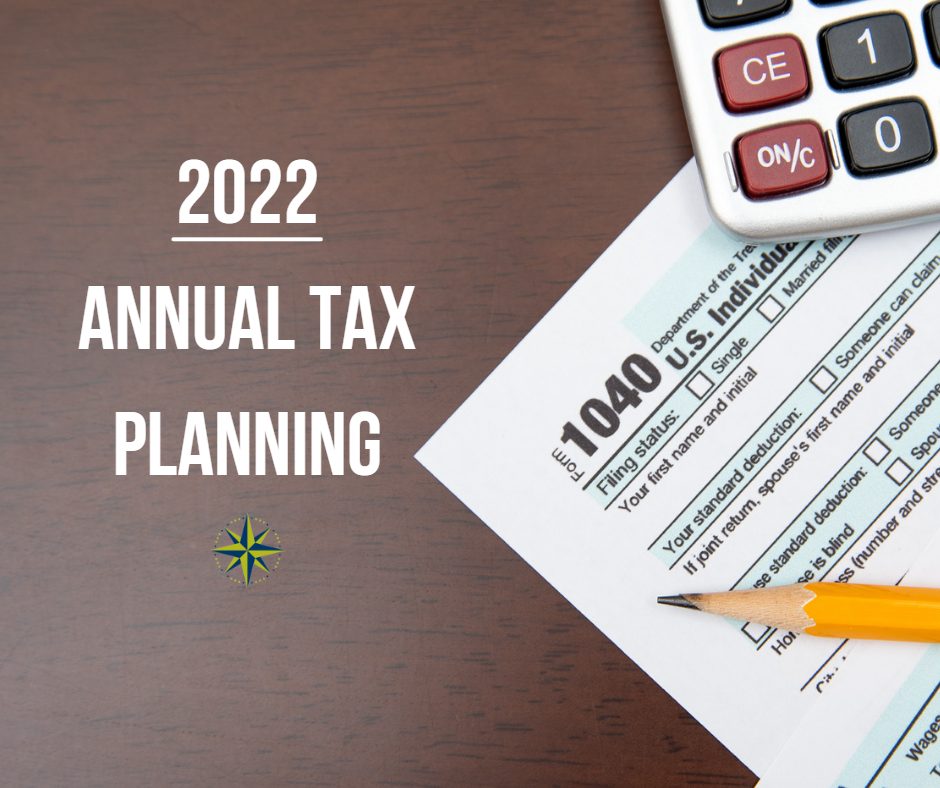2024 Annual Tax Planning & Strategy Guide We are pleased to announce the delivery of…

Annual Tax Planning Letter for 2022
As we wrap up 2022, it’s important to take a closer look at your tax and financial plans and discuss steps that can be taken to reduce taxes and help you save for your future. As you know, we affectionately call our proven process One Advisor Twice the Advice.
When we look at your financial plan and investments, we consider all tax implications and planning opportunities. It also means that when we look at your tax plan and preparation, we consider all investment and financial planning opportunities and strategies. Your plans benefit greatly from having one advisor that sees both sides of your financial life. If right now, you are thinking of a family member or friend that could benefit from this same advice, please pass along our contact information, we’re happy to talk to them so we can quantify exactly what implementing our strategies means to their plans.
Please don’t keep us a secret, we have been voted Baltimore’s Best Financial Planner for five years in a row now!
Though there has been a lot of political attention to tax law changes, inflation and environmental sustainability, political compromise has led to smaller impacts on individual taxes this year. However, with the passage of the Inflation Reduction Act of 2022, there are new tax incentives for you to consider. There are also several tax provisions that have expired or will soon. We continue to closely monitor any potential extensions or changes in tax legislation and will update you accordingly. Please follow us on social media and our newsletter for immediate and timely updates.
We’re here to help you take a fresh look at the health of your tax and financial well-being. Connect with us to discuss your personal goals and strategy so we can develop a customized plan together. If you expect changes by year end or next year, please call us to discuss as it’s better for us to be proactive and plan ahead for the changes versus reacting after the change has occurred.
Possible changes could be:
- Change in marital status
- Birth of a child or grandchild
- Death of a loved one
- Primary residence sale and move
- Sale or purchase of a rental property
- Sale of investments
- Starting a business
In the meantime, here’s a look at some things to consider as we approach year-end.
Charitable Contribution Deductions
If you are planning to donate to a charity, it’s likely better to make your contribution before the end of the year to potentially save on taxes. There are many tax planning strategies we can discuss with you about charitable giving. For example, consider donating appreciated assets that have been held for more than one year, rather than cash. By donating stock that has appreciated for more than a year, you are actually giving 23.8 percent more than if you sold the stock and then made a cash donation. The reason is simple: avoiding capital gains taxes. The maximum federal capital gains tax rate is 23.8 percent on long-term holdings and there are discussions that it may be increasing next year.
Opening and funding a donor advised fund (DAF) is appealing to many as it allows for a tax-deductible gift in the current year and the ability to dole out those funds to charities over multiple years. Qualified charitable distributions (QCDs) are another option for certain older taxpayers who don’t typically itemize on their tax returns. These are distributions from retirement accounts such as IRA’s that are made directly to a qualifying charity and thus are not included in your taxable income.
Last year, individuals who did not itemize their deductions could take a deduction of up to $300 ($600 for joint filers). However, this opportunity is no longer available for tax year 2022. Also, note that it’s important to have adequate documentation of all donations, including a letter from the charity for donations of $250 or more.
Annual Gifting
The annual gifting tax limit for 2022 is $16,000. That has increased to $17,000 for 2023. We recommend making annual gifts early in the year in case there is a law change or in case a taxpayer passes away later in the year and misses the opportunity to make the gift. Make sure checks are cashed timely.
Required Minimum Distributions (RMDs)
RMDs are the minimum amount you must annually withdraw from your retirement accounts (e.g., 401(k) or IRA) if you meet certain criteria. For 2022, you must take a distribution if you are age 72 by the end of the year, although you can elect to defer the first RMD and take it by April 1st of the following year). Planning ahead to determine the tax consequences of RMDs is important, especially for those who are in their first year of RMDs. The IRS has issued new life expectancy tables effective for the 2022 tax year, resulting in lower RMD amounts. We can help you calculate any RMDs to take this year and plan for any tax exposure.
If a taxpayer passes away after starting to take RMDs, a non-spouse beneficiary must take RMDs and cannot wait ten years to take it. If a taxpayer passes away before having started taking RMDs, a non-spouse beneficiary is not required to take anything out until the tenth year following death.
Expert Advisor Tip
Our advisors can help you map out a plan to take RMD withdrawals if you are receiving them now or are a surviving spouse or family member.
By creating a plan, you can manage your taxes better. Every situation is different and it has a lot to do with the individual’s tax bracket. For an inheritance, one example might be to start distributing sooner rather than later to utilize the lower tax bracket and perhaps use some money to help max out 401(k) contributions if you are not already doing so.
Energy Tax Credits
From electric vehicles to solar panels, “going green” continues to provide tax incentives. The Inflation Reduction Act of 2022 included new and newly expanded tax credits for solar panels, electric vehicles and energy-efficient home improvements. The rules are complex, and some elements of the law are not in effect until 2023, so careful research and planning now can be beneficial. Some items to be aware of for 2023 include new energy credits of 30% up to $1,200 annually on primary residence with no lifetime maximum.
Roth IRA Micro-Conversion Strategy
We can help you analyze the benefits of implementing a Roth IRA micro-conversion and tax bracket management strategy. This strategy allows you to fill up your current lower income tax bracket with income from a Roth Conversion. After age 72 you will be required to take money out of your traditional IRAs. If due to your RMD income, you are in 30-35% bracket, but now find yourself in the 20-25% bracket or below, converting smaller amounts of your traditional IRA to a Roth IRA, know as micro-conversions, you fill up the current year bracket and will save thousands of dollars of tax after age 72.
Capital Gains Taxed at Zero Percent when…
2022 MFJ taxable income less than $83,350 gets 0% capital gains tax rate
2023 MFJ taxable income less than $89,250 gets 0% capital gains tax rate
Roth 401k Five-Year Rule
If you are within five years of retirement and have a Roth 401k, you should move a small amount out of the Roth 401k into a Roth IRA to start your five-year clock on the five-year rule. The five-year rule for Roth IRA distributions stipulates that 5 years must have passed since the tax year of your first Roth IRA contribution before you can withdraw the earnings in the account tax-free. Money moved from a Roth 401k to a Roth IRA starts the five-year clock.
Fraudulent Activity Remains a Significant Threat
Our firm takes data security very seriously and we think you should as well. Fraudsters continue to refine their techniques and tax identity theft remains a significant concern. Call us immediately if you:
Receive a notice or letter from the IRS regarding a tax return, tax bill, or income that doesn’t apply to you. Do not contact them and send the notice to us.
Get an unsolicited email or another form of communication asking for your bank account number, other financial details, or personal information.
Receive a robocall insisting you must call back and settle your tax bill.
Important Cyber Security Tips
It’s strongly encouraged that you follow these cyber security best practices:
- Update all of your passwords at least once a year
- Use an encrypted password vault like LastPass, and you’ll never need to remember a password again
- Use a minimum of 12 characters with a combination of special characters, capital letters, and numbers. We recommend using a phrase that you’ll easily remember. For example, “I grew up on Bayberry Lane in Maryland”. The password would use the first letter of each word and replace “I” with 1 and “O” with 0 (Zero). Then you can add a few numbers to the end along with a special character. Password: 1Gu0BLiM967!
- Turn on two-factor authentication (2FA) for all financial websites and preferably any website or application that offers it.
- Regularly check for updates on each of your devices and download them as soon as they’re available. They often include security updates, which makes these updates vital to securing the device.
- Never click on unsolicited email links.
- Never – ever – include personal information like date of birth, social security numbers, or bank account information in an email.
You must take action to keep your personal financial information safe. We’re happy to walk our clients through implementing these security best practices or review anything you suspect could be fraudulent.
Virtual Currency/Cryptocurrency
The last few years have seen explosive growth in US consumer interest in crypto-currency transactions, purchases and use. Congress and the IRS have both become aggressively involved in monitoring the activities and the failure to correctly report crypto.
For example, one penalty for failure to report crypto activities can be 50% of the highest balance in the account each year.
Unfortunately, very few consumers understand the income tax and foreign reporting obligations that accompany crypto-currency activities, and the incorrect and misleading information floating around on the internet is a major concern.
Here are the seven activities that require individual transaction reporting in addition to just reporting the existence of the account. You read that correctly, each individual transaction must be individually reported. For example, if you use cryptocurrency to buy a cup of coffee, we must report that transaction individually on your return.
- Selling (Converting) crypto to US Dollars
- Trading one crypto for another
- Spending crypto directly for goods or services
- Mining crypto from your computers
- Staking or lending crypto and receiving payment in crypto or dollars
- Receiving Airdrop crypto
- Getting paid in crypto
Items 1, 2, and 3 require that we report each transaction separately on your return. Potentially hundreds or thousands of transactions must be reported if you are spending cryptocurrency, trading (even via a “Bot”), mining, etc.
We are going to remind you in our organizers, interviews, and engagement letters that these actions must be disclosed so that we may report them and have you avoid penalties.
Student Loans
Earlier this year, a student loan forgiveness program was rolled out and started accepting applications. Currently, courts have blocked the program and applications are not currently being accepted or processed. We will keep you informed of the development of the program as updates are announced.
As in the past, student loan interest continues to be deductible in 2022 up to $2,500 within certain income limits.
Click here to download the Key Tax and RetirementReference Numbers for 2022 and 2023
Additional Tax and Retirement Planning Considerations
We recommend you review your retirement goals and plan at least annually. That includes making the most of tax-advantaged retirement saving options, such as Traditional IRAs, Roth IRAs, and company retirement plans. It is also advisable to take advantage of health savings accounts (HSAs) that can help you reduce your taxes and save for your future.
If you took a Coronavirus distribution of up to $100,000 in 2020 from your retirement account, you’ll need to report the final one-third amount on your 2022 return (unless you elected to report the entire distribution in 2020 or have recontributed the funds to a retirement account). If you took a distribution, you could return all or part of the distribution to a retirement account within three years, which will be a date in 2023. We would like to work with you to strategize a plan to help restore and build your retirement savings and determine whether you’re on target to reach your goals.
Consider converting a portion of an IRA to a Roth IRA and paying taxes on the conversion in the current year, allowing for future tax-free growth and tax-free distribution. Manage the conversion by projecting how much additional taxable income can be realized in the year without skipping forward to the next tax bracket.
Consider using a back door Roth strategy to get around income limits on contributing to a Roth IRA. Ask us about this opportunity and the special rules that may apply to you.
Here are a few more tax and financial planning items to discuss with us:
- Let us know about any major changes in your life such as marriages or divorces, births or deaths in the family, job or employment changes, starting a business and significant expenditures (real estate purchases, college tuition payments, etc.).
- We’ll consider tax benefits related to using capital losses to offset realized gains and move any gains to the lowest tax brackets, if possible.
- Work together to plan appropriately for estate and gift tax purposes. There is an annual exclusion for gifts ($16,000 per donee, $32,000 for married couples) to help save on potential future estate taxes.
- Discuss Sec. 529 plans to help save for education; there can be income tax benefits to do so, and we can help you with any questions.
- Review any updates needed to insurance policies or beneficiary designations.
- Keep in mind that for 2022, if you file a joint return with taxable income of less than $83,350, capital gains are taxed at 0%. For 2023, if joint return taxable income is less than $89,250, capital gains are taxed at 0%.
- Let’s review withholding and estimated tax payments and assess any liquidity needs.
- Don’t pay property taxes and the last quarterly state estimated income taxes until January 2023 instead of December 2022 because they may be deductible again in 2023.
- If you receive a 1099K please reach out to us and we’ll help you with how to handle it.
Year-End Planning Equals Fewer Surprises
There are many other planning opportunities to discuss as year-end approaches. And, many times, there may be strategies such as deferral or acceleration of income, prepayment, or deferral of expenses, etc., that can help you save taxes and strengthen your financial position.
Whether it’s working toward retirement or getting answers to your tax and financial planning questions, we’re here for you. As always, planning can help you minimize your tax bill and position you for greater success. We offer complimentary reviews of your prior year returns to help bring your taxes to the lowest legal limit. Contact us today to schedule your complimentary review with one of our expert tax advisors!
ONE ADVISOR | TWICE THE ADVICETM
Contact us to schedule your complimentary review and find more ways to save by calling (410) 823-5442 or emailing [email protected].
For disclaimer, please follow our link below:
https://www.peakeadvisors.com/site/wp-content/uploads/2019/05/Compliance-Social-Media-Disclaimer.pdf


